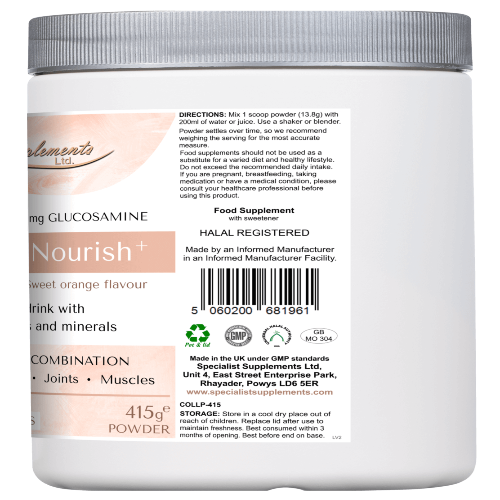Specialist Supplements
Collagen Nourish+
Collagen Nourish+
Couldn't load pickup availability
415g - Approximately 30 servings
Collagen Nourish+ is a delicious sweet orange flavour drink mix, which contains high-strength, high quality hydrolysed collagen (10g / serving), plus glucosamine HCl (800mg / serving). This powder is not only a source of collagen but an all round supplement ideal for topping up other basic nutrients.
Vitamins: A, C, D, E, B6, B12, Thiamin (B1), Riboflavin (B2), Nicin (B3), Folic Acid, Biotin (B7), Pantothenic acid (B5), - Minerals: Calcium, Phosphorus, Magnesium, Iron, Zinc, Iodine - A fuller description about these nutrients and their function etc. is below.
Usage.
Mix 1 scoop of powder (13.8g) with 200ml of water or juice. Use a shaker or blender.
Powder settles over time, it is recommended weighing the serving for the most accurate measure.
Collagen is the primary building block of the body’s skin, muscles, bones, tendons, ligaments and connective tissues. It’s in the organs, blood vessels and intestinal lining and makes up approximately one third of the body’s mass. It’s the most abundant natural structural protein in the body.
Levels in the skin deplete with age, losing 1.5% yearly. By 40 years of age, around 30% of our collagen levels are lost.
Hydrolysed collagen is a protein supplement made from collagen that has been broken down into smaller molecules known as peptides which are more water soluble, easier to digest and absorb in the small intestine, giving enhanced bioavailability.
This formula contains 10g hydrolysed collagen per serving, generally recognised to be the optimal daily intake for best results.
Contains:
Glucosamine HCl
Glucosamine is an essential part of the building material for joints and the cellular ‘glue’ that holds the body together. This formula contains 800mg per serving.
Amino acids.
Collagen Nourish + provides the following amino acids:
Alanine, Arginine, Aspartic Acid, Glutamic Acid, Glycine, Histidine, Isoleucine, Leucine, Lysine, Methionine, Phenylalanine, Proline, Serine, Tryptophan, Tyrosine, Valine
Arginine and glycine are found in collagen, used to make creatine. Creatine is stored in our skeletal muscle and is used by our bodies when we perform physical activities.
Lysine and proline are key amino acids necessary for increasing collagen production.
Vitamins.
Vitamin A contributes to normal iron metabolism, maintenance of normal mucous membranes, normal skin, vision, function of the immune system and has a role in the process of cell specialisation.
Vitamin C contributes to maintaining the normal function of the immune system, collagen formation, function of blood vessels, bones, cartilage, gums, skin and teeth, energy-yielding metabolism, functioning of the nervous system, psychological function and protection of cells from oxidative stress.
Vitamin D contributes to the normal function of the immune system and healthy inflammatory response, absorption/utilisation of calcium and phosphorus, blood calcium levels, the maintenance of normal bones, muscle function and teeth, it has a role in the process of cell division needed for normal growth and development of bone in children.
Vitamin E contributes to the protection of cells from oxidative stress.
Vitamin B1 (thiamine) contributes to normal energy-yielding metabolism, functioning of the nervous system, psychological function and function of the heart.
Vitamin B2 (riboflavin) contributes to normal energy-yielding metabolism, functioning of the nervous system, maintenance of normal mucous membranes, and red blood cells, also maintenance of normal skin, vision, metabolism of iron, protection of cells from oxidative stress and reduction of tiredness and fatigue.
Vitamin B3 (niacin) contributes to normal psychological function, energy-yielding metabolism, functioning of the nervous system, maintenance of mucous membranes, maintenance of normal skin and the reduction of tiredness and fatigue.
Vitamin B6 (pyridoxine) contributes to normal cysteine synthesis, energy-yielding metabolism, functioning of the nervous system, homocysteine metabolism, protein and glycogen metabolism, psychological function, red blood cell formation, function of the immune system, the reduction of tiredness and fatigue and the regulation of hormonal activity.
Folic acid contributes to normal psychological function, the immune system, the reduction of tiredness and fatigue, normal homocysteine metabolism, amino acid synthesis, blood formation, the process of cell division and maternal tissue growth during pregnancy.
Vitamin B12 contributes to normal energy-yielding metabolism, functioning of the nervous system, homocysteine metabolism, psychological function, red blood cell formation, function of the immune system, the reduction of tiredness and fatigue and it has a role in the process of cell division.
Vitamin B7 (biotin) contributes to normal energy-yielding metabolism, functioning of the nervous system, macronutrient metabolism, psychological function, hair and skin and the maintenance of normal mucous membranes.
Vitamin B5 (pantothenic acid) contributes to normal energy-yielding metabolism, mental performance, synthesis and metabolism of steroid hormones, vitamin D and some neurotransmitters, and the reduction of tiredness and fatigue.
Calcium contributes to normal energy-yielding metabolism, muscle function, neurotransmission, function of digestive enzymes and the maintenance of normal bones.
Phosphorus contributes to normal energy-yielding metabolism, function of cell membranes, the maintenance of bones and teeth.
Magnesium contributes to a reduction of tiredness and fatigue, electrolyte balance, normal energy-yielding metabolism, functioning of the nervous system, muscle function, protein synthesis, psychological function, the maintenance of bones and teeth, and it has a role in the process of cell division.
Iron contributes to normal cognitive function, energy-yielding metabolism, formation of red blood cells and haemoglobin, oxygen transport in the body, function of the immune system, the reduction of tiredness and fatigue, the process of cell division and to the cognitive development of children.
Zinc contributes to normal DNA synthesis, acid-base metabolism, carbohydrate metabolism, cognitive function, fertility and reproduction, macronutrient metabolism, metabolism of fatty acids and vitamin A, protein synthesis, the maintenance of bones, hair, nails and skin, the maintenance of normal testosterone levels in the blood, vision, function of the immune system, the protection of cells from oxidative stress and it has a role in the process of cell division.
Iodine contributes to normal cognitive function, energy-yielding metabolism, functioning of the nervous system, maintenance of skin, production of thyroid hormones and thyroid function and growth of children.






